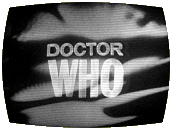 The TARDIS arrives in a verdant forest, which the Doctor, Dodo and Steven assume must be on Earth. They are soon proven wrong when alarms sound in the “forest,” which turns out to be part of a vast spaceship carrying the last remnants of the human race away from a doomed Earth, ten million years in the future when the sun is slowly edging toward its nova stage. The Doctor and his friends also meet the one-eyed alien Monoids, peaceful creatures which seem to languish in a benevolent servitude to the ship’s human crew. But the travelers’ arrival becomes a bad omen when Dodo, suffering from the common cold, accidentally transmits it to the commander of the ship – unaware that the human race ten million years hence lacks her immune system. Condemned for what is perceived to be biological warfare, the Doctor races to immunize the future humans against the cold. Having cleared his name, the Doctor and his friends depart in the TARDIS – but accidentally return to the same place seven centuries later, finding the Monoids in control and the last of the human race in the chains of slavery.
The TARDIS arrives in a verdant forest, which the Doctor, Dodo and Steven assume must be on Earth. They are soon proven wrong when alarms sound in the “forest,” which turns out to be part of a vast spaceship carrying the last remnants of the human race away from a doomed Earth, ten million years in the future when the sun is slowly edging toward its nova stage. The Doctor and his friends also meet the one-eyed alien Monoids, peaceful creatures which seem to languish in a benevolent servitude to the ship’s human crew. But the travelers’ arrival becomes a bad omen when Dodo, suffering from the common cold, accidentally transmits it to the commander of the ship – unaware that the human race ten million years hence lacks her immune system. Condemned for what is perceived to be biological warfare, the Doctor races to immunize the future humans against the cold. Having cleared his name, the Doctor and his friends depart in the TARDIS – but accidentally return to the same place seven centuries later, finding the Monoids in control and the last of the human race in the chains of slavery.
written by Paul Erickson & Lesley Scott
directed by Michael Imison
music by Tristram CaryGuest Cast: Eric Elliott (Commander), Inigo Jackson (Zentos), Roy Spencer (Manyak), Kate Newman (Mellium), Michael Sheard (Rhos), Ian Frost (Baccu), Ralph Carrigan (Monoid Two), Terence Bayler (Yendom), Edmund Coulter (Monoid One), Frank George (Monoid Three), John Caesar (Monoid Four), John Halstead, Roy Skelton (Monoid voices), Stephanie Heesom, Paul Greenhalgh (Guardians), Terence Woodfield (Maharis), Brian Wright (Dassuk), Eileen Helsby (Venussa), Richard Beale (Refusian voice)
Broadcast from March 5 through 25, 1966
LogBook entry & review by Earl Green
A very clever and unique story in the history of Doctor Who, The Ark is one of the few tales that follows up on the consequences of the Doctor’s travels instead of – as often happens – leaving the guest characters to clean up the mess. Though relatively simple, The Ark is rooted in solid science fiction, and could be considered eerily prescient for its “prediction” – more creative coincidence than clairvoyance – of the decline of the human immune system. There’s also a certain charm to the unabashed 60s-ness of this segment; in one scene, when Dodo says “okay,” the Doctor pledges to teach her to speak proper English!
William Hartnell is, as always, serious and believable as the original Doctor, and the high stakes in both halves of the story are a good showcase for his talents. Though I don’t often see any indication that this Doctor Who story is well-remembered, it should be – it’s one of the best of the Hartnell era.
